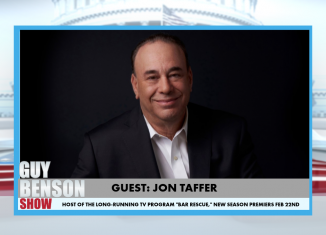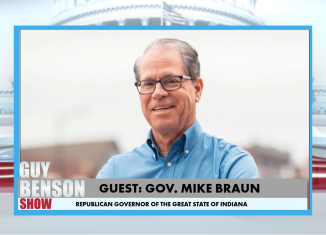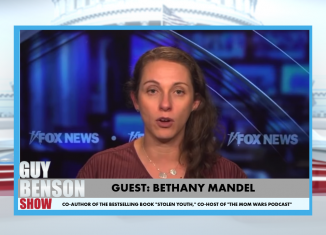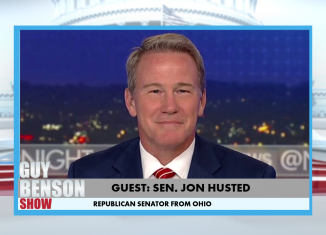GUY BENSON SHOW: Harris Faulkner Walks in the Footsteps of Her Father
Harris Faulkner, anchor of The Faulkner Focus, host of Outnumbered and Bestselling Author of Faith Still Moves Mountains: Miraculous Stories of the Healing Power of Prayer, joined the Guy Benson Show today from our NY studio to discuss her brand-new limited series on Fox Nation called “Vietnam: Footsteps of My Father”. The mini series features Faulkner travelling to Vietnam and discussing her journey where she traces her father’s footsteps as a combat veteran in Vietnam. Faulkner shares this journey as she explores lessons of faith, bravery, and perseverance in the country. Listen to the full interview and read the automated transcript below.
Full Interview:
Listen to the full podcast:
Read the automated transcript below:
Guy Benson: It’s the happy hour here on the Guy Benson Show on this Monday here in D.C.. Glad you’re tuned in wherever you happen to be. Guy Benson show.com is our website. The podcast is free and on demand every day as soon as the show is over. Catch me tonight on a special report. I’ll be joining the panel towards the end of the 6 p.m. hour that’s on Fox News Channel. Looking forward to that. This hour on the radio, sponsored in part by the finished long drink, which is delicious and refreshing. We recommend it if you are 21 plus only. Always drink responsibly. The long drink.com I was actually over the weekend in Rhode Island and I passed a liquor store and I ducked my head in. Not only did they have the long drink, they had all five flavors, including peach, which knocked my socks off, took a photo and sent it to my buddy, the long drink.com. Well, joining us now from our New York studios is Harris Faulkner, anchor of the Faulkner Focus. I was on today, co-host of outnumbered. I’ll be on again soon, and bestselling author of the book Faith Still Moves Mountains, and she’s out right now with this incredible limited series on Fox Nation called Vietnam Footsteps of my Father. Harris. Always good to have you here. Welcome back.
Harris Faulkner Thank you. It is a pleasure to be here. And oh my gosh, your private life is so much exciting, more exciting than mine as a parent. And you’re like, I don’t know where you find the time.
Guy Benson: Well, you know, I was at an event over the weekend and it was fantastic, but it just happened to be right in between my mom’s birthday, which was recently, and my dad’s birthday, which is today. Oh, wow. So they drove down from Massachusetts and we had dinner and we hung out. It was a really special time, in addition to the work obligations that I had. But, you know, speaking of dads, you were just telling me off the air that this new project for Fox Nation Vietnam Footsteps of my father has been a ten out of ten for you professionally. Explain what that means, what that entails.
Harris Faulkner Well, professionally, journalistically speaking, it’s storytelling that is aided with my father’s own voice that I captured for a book I wrote six years ago, not ever knowing that I would even retain those tapes because, you know, we’ve all had a couple of phones in that time, and something always gets lost in the translation of the cloud somehow for me. So it was just by a miracle that I had 3 or 4 recordings of him talking about his military missions for that book and nine rules of engagement at the start of each chapter was a little blurb, you know, just a quote from him. When we got ready to do Vietnam. Footsteps of my father. I also wasn’t thinking about it when I came home from those ten days in Vietnam. I realized. I had some more healing to do after losing both parents in six years, unexpectedly and. I started listening to voicemail messages that my mom and dad had left me that my phone hadn’t managed to delete. And I came across a couple of recordings and stuff on my phone, and I asked my husband, who had actually done those interviews. Can you possibly find any more? And he said, well, there were four altogether. We got all four of them. And I said, I’m going to put this in the piece. And the texture of having that voice. I used to call him the black Walter Cronkite because his voice was so pure. Really brings it home for me. So professionally, I think it’s some of the best storytelling I’ve ever done. But personally, it’s been a magical journey. It really has. I had my heart broken so many times that I was in Vietnam, because I realized how close to death he came so many times, and it broke my heart because I never got to hear that directly from him. After having seen the place like I wish we could have gone together, but short of being together, I took his. Military burial flag in my backpack with me to Vietnam. And when I followed his combat pilot trail and we rode a boat on the Saigon River, which above which he had flown kind of low to keep from getting hit by the Viet Cong. His plane was Swiss cheese. When he hit the ground, it was just a miracle he was injured, but he was alive. I got to see where that happened. And I took the flag out at that point. And off the back of the boat, which you’ll see in the limited series on Fox Nation, is a communist flag on the boat. We couldn’t bring them the freedom that they wanted so desperately, the democracy that South Vietnam wanted to keep. We couldn’t we couldn’t save it for them. The enemy. Had was entrenched. And in fact, I think you have a clip of me claustrophobic me inside of a tunnel that’s reminiscent of what Hamas would have built back then. I mean, those are much more sophisticated now because they’ve spent all that aid money on them.
Guy Benson: Can we listen to that real quick?
Harris Faulkner Yeah, let’s.
Guy Benson: Take a listen. So it’s cut 36.
CUT 36 PLAYS
Guy Benson: You know Harris, listening to that, and I know with the visuals at Fox Nation, it’s even more powerful. You can see those scary, tiny, dark, hot, deadly tunnels. And it’s like, I can imagine you were stepping back in time and just the visceral fear that these guys must have experienced. And then for those like your dad, who survived and came home for years, they were treated so poorly.
Harris Faulkner Yeah. You know, I, just for a moment with the tunnels. I took a moment in footsteps of my father to remember all those men who did not come home. Those who were taken P.O.W.. Mia. Some of whom they’re still looking for, the missing in action. And our ambassador in Vietnam, Mark Knapper, is a legacy diplomat family. And he met me on Red beach, which was the first place on Marines hit the ground as our combat troops had arrived in Vietnam for the first time to fight. And they were there to stay for some time. I think of what has happened since then, and those tunnels are such a great example of what can be. They were tunnel rats are guys who went down there. That was their nickname in the military. And just to be able to survive long enough. Your mission was to kill the enemy. I can’t even imagine a gunfight underground. With no oxygen. With 100 degree plus heat, it was 100 aboveground. When I went. It was much more than that below ground. And it’s not vented. You know, for air conditioning or anything. But that was the very jungle that we ended up hitting so hard with B-52 we couldn’t get them. They were entrenched. In fact, at some point, our base was built over the tunnels and we couldn’t figure out how the enemy kept popping up. They they were they were not going to lose that war. They were all willing to die for it. The North Vietnamese Communist army and the Viet Cong guerrilla warriors. They were stone cold terrorist killers, and a lot of what they did reminds me so much of Hamas today. But I tell you, when you go someplace where we spent so much blood and treasure and you realize you come home. When the country was divided, we owed them something more than outrage and anger. Now, I say we as a nation. Of course I was a baby. But. I learned guy. What to say now to a Vietnam veteran. You know, we always have been told, hey, when you see somebody in the military say thank you for your service, right? And that works for most people. But that war was so unpopular that there were guys who came home missing limbs. And in, like all of our warriors, face death and trauma and change when they come home physically. But the mental wear and tear of people hating you for wearing that uniform was a lot. So when I see a Vietnam veteran now. And maybe when you do and other people because I’m telling the story now. Can say these words I learned from them. Welcome home. Thank you for loving our nation so much that you would go so far in her name. I met with Vietnam veterans who would have been contemporaries with my dad had he still been alive. They were well into their 80s. And all of them in really good shape, by the way. I mean, they were military guys. They were going to fight till the end. And they said, we took off our uniform, won in tears. 50 years ago and I’ve never taken it out again. My dad was leadership. I found that out on this trip, too. I didn’t know that he was making, you know, going up the chain of ranks while he was in Vietnam. Two tours of duty. So he didn’t come home and take off his uniform. He wore it until he made lieutenant colonel and led at that level as well here, back at home. But it wasn’t easy. And we owe them a debt of gratitude.
Guy Benson: Especially because we.
Harris Faulkner Got democracy.
Guy Benson: And we didn’t at all in many cases, express that gratitude when they came home. I’m just trying to imagine being, in many cases, sent there. It’s not like it was their choice, right? They were drafted, sent there, and many of them were.
Harris Faulkner Some of them were. And some of them wanted to go. You know, we were in a different space in our country. We had people who love this country far more than the numbers who say they hate it today. And we better get a grip on that. Our recruitment is down right now, and we got people walking around saying Death to America and death to Americans. They want to kill Jews. And I would argue anybody in this country who doesn’t believe militantly like they do, the people who call themselves protesters, but then end up going to jail for rioting. Although our soft on crime system in many cities doesn’t keep them there for long, doesn’t prosecute them. Look, we got to get a handle on this because with all the civil rights that were going on when my dad went to serve, he made that decision. He said, this is the country because of that great U.S. Constitution that has the most potential. We are struggling. He faced racism. And at the same time, he said, America has the most potential of any planet, any, any country on the planet. If I enroll and I get, you know, deployed, I will fight in her name. And he did. Young people today. And I don’t want to put everybody in one basket. And not all of them are young. Some of the protesting we saw here had paid insurgents, basically by some of these, far left groups, activist groups. And you can follow the money on that. It’s one thing to want to be pro-Palestinian, feed the people in a war zone. By the way, there are plenty. You can go to Darfur today and feed a lot of people. You can go to South Bronx today and feed a lot of people, which is going to be interesting when the current president goes there. Or if you ever does the former president’s going to go. Trump’s going to go. Would Biden go? I don’t know, but some of this is political because Vietnam is still communist. We are working trade agreements. Watch your furniture and your your textiles and your clothing. You’re going to see made in Vietnam more and more. China hates that they share checkpoints with Vietnam. It endangers them to be friends with us. But they know that we are the future. We better retain that exceptionalism. We need to retain that. We are.
Guy Benson: Outside of.
Harris Faulkner A Beacon of Light.
Guy Benson: A lot of the young people that get a lot of attention on the news, whether it’s the people engaged in some of these protests or the encampments or what have you. There’s a whole different group of them who put on the uniform and serve valiantly and love the country, and they get a lot less ink, but they’re out there, too, a lot of them. And we thank God for them. We thank God for people like your dad and the people that he served with. And to come back to my point. They were asked by their country whether they volunteered to serve or they were drafted. They were told, go to this jungle and put your lives on the line. And a lot of them did not come back. Tens of thousands did not come back. That’s right. Others came back with physical and mental wounds. And in far too many cases, they were literally or figuratively spat upon by people in this country when they came home, which is a disgrace. And I’m glad that you’re giving us some guidance on the welcome home. In addition to thank you for your service. Welcome home is probably something a lot of them still need to hear. And you were just telling me also before we had this conversation on the air, Harris, when you put together this incredible limited mini series on Fox Nation Vietnam footsteps of my father, you have subsequently you have since heard from a number of the men who served by his side. People you’ve never met had never heard from before, people who may not have social media. They are finding ways to find you because of this mini series. Vietnam footsteps of my father. Talk about that.
Harris Faulkner Well, it is amazing to hear from anyone who might have known my father and, you know, known the unit, one of the many that he was commanding. And it’s also heartbreaking because many of these men, too, like my dad, if he had survived past Christmas of 2020, he died peacefully. They’re in their 80s. So we’re losing them every day. And, you know, I pray that that this project doesn’t just unite me with with people who may have known my own dad, and that is special. But we must never forget them. They must not become the invisible warriors among us. Because there will come a time when we may be called to fight and defend this republic. You never know. We can’t see the future. We need men and women among us who are willing to do that. And our greatest recruiters right now. Our Vietnam vets and vets of all of the wars who are still among us and can tell their stories. We must listen and learn. And I feel very, very grateful that I got to sit down. This is another part of the story. There was a former Viet Cong soldier, also in his 80s, now maybe a little younger than that. These guys may have been in their 70s. And, I think about this. They were mortal enemies and an American veteran. And I meet them at, a Vietnamese sweetened tea. It’s a little, you know, a place where we just went and had some delicious banana bread and and tea. And their friendship is real. They are right there, right now working on trying to treat people with generational Agent Orange deformities. By the way, our soldiers came back, and those who had children who had had been exposed to Agent Orange. Those soldiers and warriors had problems and also their families were affected. Same thing in Vietnam. So they have come together on a common cause and formed a friendship. Two men who would have tried to kill each other 50 years ago.
Guy Benson: Wow.
Harris Faulkner Yeah.
Guy Benson: It sounds like a transformational trip. And to spend ten days a week and a half over in Vietnam.
Harris Faulkner Oh, that doesn’t count flying 22, 24 hours each way.
Guy Benson: Yes. Long way to go. But how incredibly special and also meaningful. Not just for you personally, but I think for for the country and who people I know are fighting for us and who care about our veterans, who care about our history. This is this is part of it.
Harris Faulkner And our Future. Watch it.
Guy Benson: Exactly. Because there are lessons, there are always lessons for our future in our history. And you can watch Vietnam. Footsteps of My Father with Harris Faulkner right Now, a limited series available exclusively on Fox Nation. Harris, thank you so much for spending some time with us today and having me on your show earlier. Always enjoy it. We’ll talk again soon.
Harris Faulkner Thank you Guy. And we even got in a little politics.
Guy Benson: We did. We always do.







